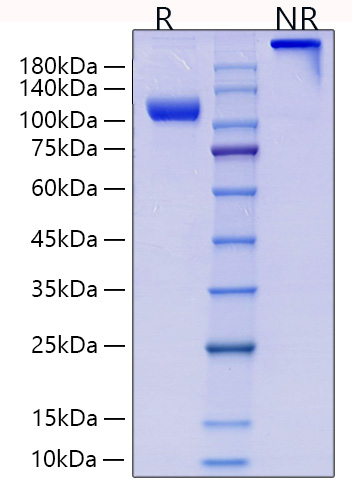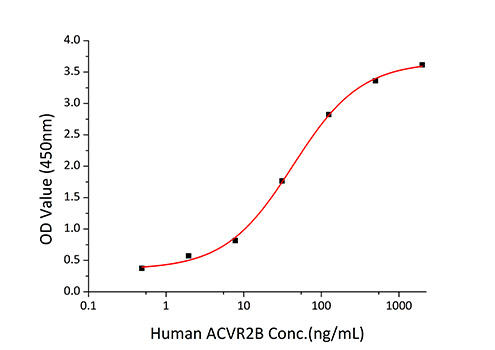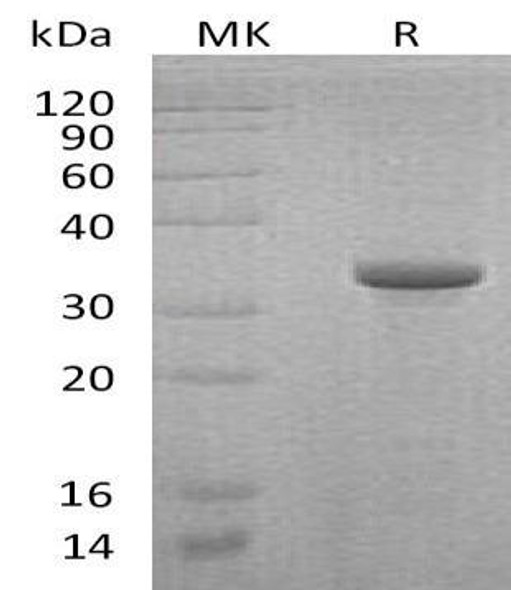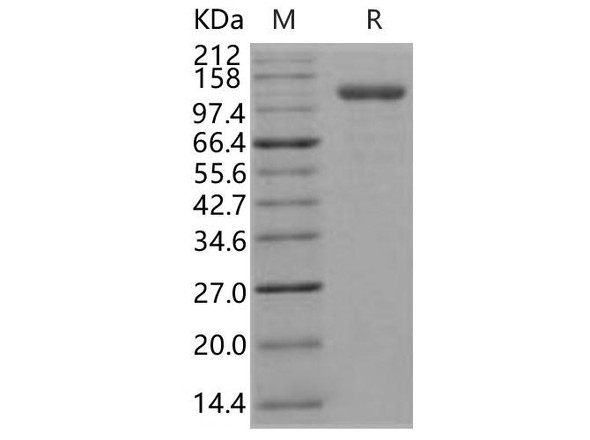Description
Recombinant Human Endoglin/ENG/CD105 Protein
The Recombinant Human Endoglin/ENG/CD105 Protein is a biologically active recombinant protein that plays a significant role in various cellular processes and signaling pathways in human biology. This protein is widely employed in immunological research, cell biology studies, protein-protein interaction analyses, and therapeutic development, providing researchers with a reliable tool for investigating Endoglin/ENG/CD105 function and its implications in health and disease.
This product (SKU: RPCB0945) is produced using HEK293 cells and features a C-hFc&His tag for convenient detection and purification. The protein exhibits a calculated molecular weight of 87.54 kDa with an observed molecular weight of 100-140 kDa under denaturing conditions, achieving ≥ 95 % as determined by SDS-PAGE.. Functional bioactivity has been validated through rigorous quality control assays, confirming its suitability for demanding research applications.
Key Features
| High Purity by Affinity Chromatography | |
| Mammalian & Bacterial Expression Systems | |
| High lot-to-lot consistency via strict QC |
| Product Name: | Recombinant Human Endoglin/ENG/CD105 Protein |
| SKU: | RPCB0945 |
| Size: | 10 μg , 20 μg , 50 μg , 100 μg |
| Reactivity: | Human |
| Synonyms: | END, HHT1, ORW1, CD105, ENG, endoglin |
| Tag: | C-hFc&His |
| Expression Host: | HEK293 cells |
| Calculated MW: | 87.54 kDa |
| Observed MW: | 100-140 kDa |
| Gene ID: | 2022 |
| Protein Description: | High quality, high purity and low endotoxin recombinant Recombinant Human Endoglin/ENG/CD105 Protein (RPCB0945), tested reactivity in HEK293 cells and has been validated in SDS-PAGE.100% guaranteed. |
| Endotoxin: | < 0.1 EU/μg of the protein by LAL method. |
| Purity: | ≥ 95 % as determined by SDS-PAGE. |
| Formulation: | Lyophilized from a 0.22 μm filtered solution of PBS, pH 7.4. |
| Bio-Activity: |
|
| Reconstitution: | Centrifuge the vial before opening. Reconstitute to a concentration of 0.1-0.5 mg/mL in sterile distilled water. Avoid vortex or vigorously pipetting the protein. For long term storage, it is recommended to add a carrier protein or stablizer (e.g. 0.1% BSA, 5% HSA, 10% FBS or 5% Trehalose), and aliquot the reconstituted protein solution to minimize free-thaw cycles. |
| Storage: | Store at -20℃.Store the lyophilized protein at -20℃ to -80 ℃ up to 1 year from the date of receipt. After reconstitution, the protein solution is stable at -20℃ for 3 months, at 2-8℃ for up to 1 week. |
Endoglin, also known as CD105, is a type I homodimeric transmembrane glycoprotein with a large, disulfide-linked, extracellular region and a short, constitutively phosphorylated cytoplasmic tail. Endoglin contains an RGD tripeptide which is a key recognition structure in cellular adhesion,,suggesting a critical role for endoglin in the binding of endothelial cells to integrins and/or other RGD receptors. Endoglin is highly expressed on vascular endothelial cells, chondrocytes, and syncytiotrophoblasts of term placenta. It is also found on activated monocytes, mesenchymal stem cells and leukemic cells of lymphoid and myeloid lineages. As an accessory receptor for the TGF-β superfamily ligands, endoglin binds TGF-β1 and TGF-β3 with high affinity not by itself but by associating with TGF-β type II receptor (TβRII) and activates the downstream signal pathways. In addition, in human umbilical vein endothelial cells, ALK-1 is also a receptor kinase for endoglin threonine phosphorylation, and mutations in either of the two genes result in the autosomal-dominant vascular dysplasia, hereditary hemorrhagic telangiectasia (HHT). Endoglin has been regarded as a powerful biomarker of neovascularization, and is associated with several solid tumor types.








